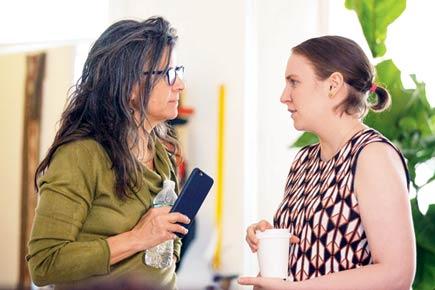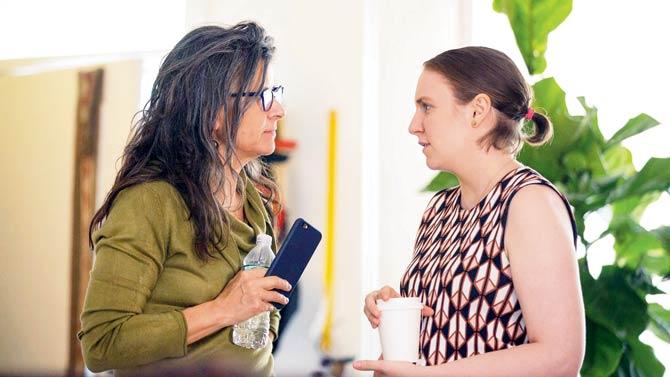Whether you decide to be a mother or not, your choice does not make you any less of a woman, and don’t let anyone tell you otherwise


A still from the Painful Evacuation episode of Girls. Pic/official page of HBO
ADVERTISEMENT

Despite my reservations about the show, revolving around my inability to either relate to the characters or feel empathy towards them, because their lives are marked by dilemmas that are too first world, I have been a loyalist. Last week’s episode amazed me. It was brilliantly written, impeccably enacted, and fabulously shot. Titled ‘American Bitch’, a play on the intended title of a Philip Roth novel, the episode evolves in the concentrated space of a lavish New York apartment where a supposedly famous white American male novelist lives. Hannah has been invited by him so he can explain his side of the allegations made against him by a swarm of women whose claim is that he sexually manipulated them and took undue advantage of the power dynamic that marked their interactions with him. The bulk of the episode involves sophistry, where Chuck Palmer, tries to convince Hannah he is the true victim. She doesn’t buy into any of his arguments, but, soon enough, is shocked to realise he had been manipulating her all along. It’s a powerful episode because it plays with the notion of female agency, the thing that differentiates an empowered woman from one who has yet to feel emancipated. It exposes how so often as a woman you believe you are in control of your immediate environment only to find you were being delusional about your power.
So, the latest episode, ‘Painful Evacuation’, begins with Hannah interviewing a writer - a woman who advocates childlessness as an essential ingredient in order to be a committed writer. When she tells Hannah to pen that piece of intentional wisdom, she is ritualistically passing it down to her. The end of the episode serves as a counterpoint to this moment. Hannah, who had been nursing a UTI, finds out, when she goes to the hospital, that she is pregnant. When the doctor, who turns out to be a man she had slept with many seasons ago, (in the episode “One Man’s Trash”) offers, as a good-will gesture, to fund her abortion, she tells him off for presuming that was what she wanted. It struck me right then that in a hyper-moralistic and hypocritical country like India, which has such a regressive mindset towards single women who live independently and have active sex lives, being told you are or might be pregnant would rarely ever trigger any other kind of response other than to abort.
Recently, I read an insightful Vulture article by a woman, who happens to be a mother, about how TV uses pregnancy as a trope to signify a shift from a freewheeling lifestyle to one that is more “grown up”. She was disappointed that motherhood was becoming synonymous with maturity. While I agreed with her general observations, I read her viewpoint as being in tandem with a first-world mindset, one that could take for granted the fact that a woman deciding to continue a pregnancy could be routine and unchallenged, unlike in a third-world setup where it is still fairly inconceivable for an unmarried woman in her 20s and 30s to even embrace such a decision, despite the fact that she may be more “grown up” and financially secure than her first-world counterpart, purely because she has struggled to get to whatever point in her life and career she has managed to arrive at.
What bothers me is this conflict over whether it’s possible to balance having children with having a career, and it scares me to learn we live in a world where society puts the onus of child rearing on women instead of conceiving ways to make it easier for us to lead career-fulfilling lives.
I would love to offer women of my generation, particularly single women in their early 30s dealing with the conundrum of whether to have children or not, this unsolicited advice - listen to your gut feeling. Don’t let anyone tell you you are less of a woman until you experience the trauma of childbirth. Motherhood must be a choice.
As for me, I think I’m grown up enough not to confuse my maternal instincts with the maternal urge. As a woman writer, I do not believe childlessness is the natural state of the female author. Agency is.
Deliberating on the life and times of Everywoman, Rosalyn D’Mello is a reputable art critic and the author of A Handbook For My Lover. She tweets @RosaParx. Send your feedback to mailbag@mid-day.com
 Subscribe today by clicking the link and stay updated with the latest news!" Click here!
Subscribe today by clicking the link and stay updated with the latest news!" Click here!






